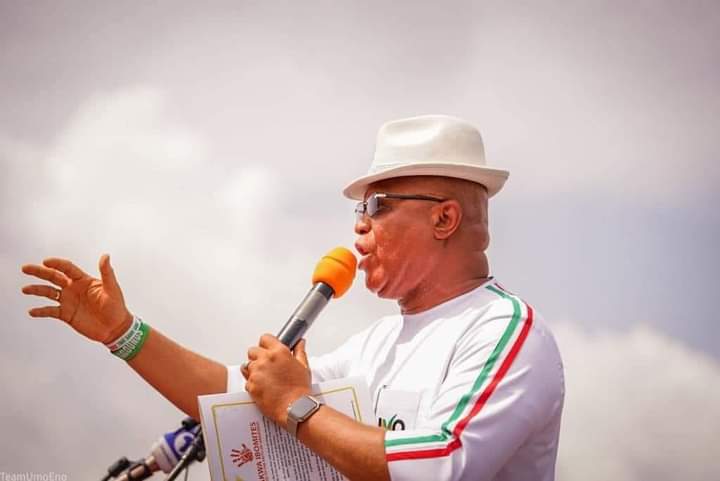In its 35 years of existence, Akwa Ibom State has had 10 governors or administrators who have demonstrated understanding of the truism that governance is a continuum, regarding infrastructural development. The practice has been that of one leader after the other adding building blocks to the edifice that has continued to rise majestically into the horizon, which goes by the sobriquet of Land of Promise, in the same manner house builders do.
This exercise gained momentum from the advent of the Fourth Republic in 1999, with the three democratically elected administrations paying greater attention to urban renewal through construction of roads and bridges, opening up of communities, provision of health and educational facilities, power, etc. This has accounted for the rapid development the state has witnessed over time.
Pastor Umo Eno, who is contesting election to be the fourth governor of the state on the platform of the Peoples Democratic Party (PDP), is not about to deviate from the path the past two elected governors and the incumbent have trodden. But in doing so, he would be different not just from those before him in Akwa Ibom, but the entire country, as well.
The governorship candidate has signified intention to go beyond providing infrastructure to making infrastructure maintenance a major focus of his administration, if given the mandate. This intention is well laid out in an economic blueprint with the acronym, A.R.I.S.E., which covers the four major areas an administration headed by him would give priority attention, namely, agricultural revolution, rural development, infrastructure maintenance/advancement, security management and educational advancement.
Eno’s decision to go beyond provision of infrastructure is informed by the general malaise of value for public infrastructure and in some cases challenged maintenance culture for same. This goes beyond Governments which are wont to see their responsibility as beginning and ending with construction of roads, bridges and structures for public use, without a well thought about maintenance plan which is the reason infrastructure decay is somwhat of a culture in Nigeria.
The poor maintenance culture in the country often leads to a situation in which public funds are wasted in either rebuilding existing infrastructure and facilities, or building new ones, with monies that could have been channeled into other areas of need.
“Our challenge in Nigeria has never been the provision of infrastructure, but maintaining them”, Eno says, in his economic blueprint. “Infrastructural maintenance would be our priority, to ensure continued functionality and viability as done by the current administration. It is our belief that maintenance of existing facilities is far cheaper than building new ones. Building new facilities as replacement to mismanaged assets would amount to wasting our scarce resources that would otherwise be put into more productive use.”
This is one of the strategies the governorship candidate would put in place towing the line of consolidating his predecessors efforts. Many years of managing human and material resources in the private sector where he spent nearly all his adult working life, with outstanding success, has equipped him with the capacity to manage public resources in the position of a state governor. He showed a glimpse of his capacity to manage public resources during his stint as commissioner for lands and water resources in the administration of Governor Udom Emmanuel.
The candidate’s promise to pay attention to infrastructure maintenance is a competence trait which stands him out on capacity to bring something new into governance. Many see the promise as an indication of his readiness to lead and serve not just Akwa Ibom state, but the country as a whole.
“We may see the end of the practice of deliberately leaving public infrastructure to fall into decay as a ploy for awarding resuscitation contracts and repairs, which may end up in private pockets as we have seen in some states” says Iniobong Ekwere, a Lagos-based, Akwa Ibom born lawyer. “From what is generally known of Pastor Umo Eno based on his antecedents, he will bring integrity into governance. And one of the ways to do this is to curb any wastage emanating from lack of maintenance which has stifled development in Nigeria”.
Eno has promised to look into the area of power supply for the people of the state, in view of its critical role in development. The government of Obong Victor Attah conceptualized and built a power plant in Ikot Abasi, to prepare grounds for an infrastructural renaissance in the state. But despite its ownership of a facility that should guarantee uninterrupted power supply for the state and its environs, Akwa Ibom as with every other state still grapples with the problem of inadequate supply of electricity due mainly to the fact that power generation, transmission and distribution is on the Exclusive Legislative List. This causes a situation which the state literally has no say in how it consumes the power it generates.
However in May of 2022, the Senate voted to remove power from the Exclusive Legislative List into the Concurrent List. When amendments to the 1999 Constitution are eventually passed into law, it would be possible for states to generate, transmit and distribute power within and outside their territories.
The PDP candidate sees this as a welcome development – one that would give impetus to his administration’s effort at providing electricity to every nook and cranny of the state, if he becomes governor. “Good enough, power generation is now in the concurrent list; we will have to look at the issues involved and ensure that the project comes alive and serve the people much more than it is doing at the moment,” Eno says.
He said his administration would also look in the direction of “environment related, environmentally friendly but reliable off grid solutions that can power small-holder endeavours in the local communities.” This, he assured, would be part of his administration’s programmes to arrest rural-urban drift. He identified lack of basic infrastructure, amenities and facilities as some of the factors that encourage the drift. “People need not move from their rural communities to urban centres on account of lack of basic amenities like electricity and portable water,” he says. “The rural economy can have a major turnaround boost and great multiplier effect if these two facilities are provided. And we will focus our attention on those.”
Eno is campaigning to be governor of Akwa Ibom on the strength of his success as a private sector player with proven character, competence, capacity and compassion. His brief tenure in the current administration exposed him to the rudiments and intricacies of public office in the executive arm of government. The people of the state have a choice on March 11, 2023, to vote to go forward, or attempt a new experiment.
Add a comment






